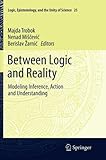Disjunctive Facts and Superposition of States
Berislav Žarnić
Faculty of Humanities and Social Sciences, University of Split
Abstract Let us denote by $\mathsf{descriptum}(p \sqcup q)$ the unobservable state of affairs described by the 'quantum disjunction' of basic physical propositions $p$ and $q$ describing mutually exclusive (`orthogonal') observable states. No such disjunctively composed state of affairs is allowed by Tractarian postulate of unique mode of composition of states of affairs. Quite the opposite holds true in the (realistic interpretation of) quantum mechanics: it allows mutually exclusive states of affairs of the same object and the same magnitude to co-exist. If co-existence of orthogonal states is admitted, then a different kind of picture relation must be introduced to account for possibility of describing this kind of reality. A new logico-metaphysical situation appears when metaphysics allows for disjunctive composition of states of affairs and when logic accepts the possibility of linguistic representation of the disjunctive composition.
